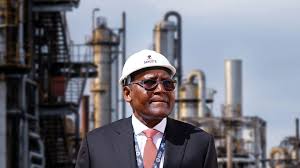July 12, 2025
President of the Dangote Group, Alhaji Aliko Dangote, has cast serious doubt over the future of Nigeria’s state-owned refineries, saying they may never operate effectively again despite an estimated $18 billion already invested in their rehabilitation.
Dangote made the remarks while hosting members of the Global CEO Africa group during a visit to the Dangote Petroleum Refinery on Monday.
According to the industrialist, his decision to build the 650,000-barrel-per-day (bpd) private refinery was driven by the federal government’s refusal under the late President Umar Musa Yar’Adua to privatise the refineries located in Port Harcourt, Warri, and Kaduna.
“The refineries we initially bought in 2007, which were owned by the Nigerian government, were producing only about 22 per cent of the required petrol. After the change in administration, we were compelled to return them. The new government believed the refineries could be fixed, but to date, after about $18 billion spent, they are still not working,” Dangote said.
He further argued that the idea of rehabilitating outdated infrastructure was flawed, comparing it to trying to modernise a car built 40 years ago.
“Even if you replace the engine, the body can’t handle the technology. That’s what’s happening with the refineries,” he added.
Obasanjo Echoes Concern
Former President Olusegun Obasanjo, who privatised the refineries during his tenure, had also expressed skepticism about their viability. In an earlier interview, Obasanjo revealed that investors, including Dangote, paid $750 million for the refineries, but the deal was reversed by his successor.
“I told President Yar’Adua that NNPC cannot manage those refineries, but he was convinced otherwise. Now, not only have the refineries failed, but they’ve also become financial drains,” Obasanjo said.
He alleged that corruption and mismanagement within the Nigerian National Petroleum Corporation (NNPC) were partly responsible for the repeated failures.
“In any civilised country, those responsible should be held accountable. Since that time, over $2 billion more has been squandered on refineries that remain idle,” Obasanjo stated.
He added, “If anyone tells you today that those refineries are functional, ask them why we are relying on Dangote’s refinery. Aliko will make his refinery work. He’ll not only run it but make it deliver.”
Nigeria’s three major government-owned refineries have struggled for decades, operating far below capacity and incurring billions in maintenance costs with little to no output. The Dangote Refinery, expected to fully commence operations this year, is being viewed as a game changer for Nigeria’s energy sector, potentially ending the country’s dependence on fuel imports.






